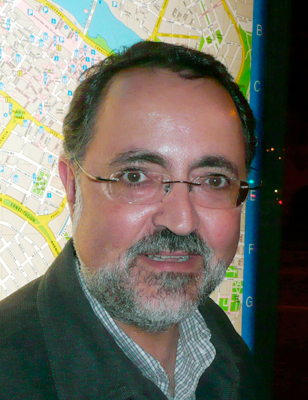- ON THE DECADE
- THE DECADE'S CAMPAIGN
- REPORTING ON PROGRESS
- THE DECADE'S PROGRAMMES
- FOCUS AREAS
-
- Access to sanitation
- Financing water
- Gender and water
- Human right to water
- Integrated Water Resources Management
- Transboundary waters
- Water and cities
- Water and energy
- Water and food security
- Water and sustainable development
- Water and the green economy
- Water cooperation
- Water quality
- Water scarcity
- FOCUS REGIONS
- RESOURCES FOR
- UN e-RESOURCES
International Annual UN-Water Zaragoza Conference 2012/2013
Preparing for the 2013 International Year. Water Cooperation: Making it Happen! 8-10 January 2013
Interviewing Faraj El-Awar, Programme manager of the Global Water Operators' Partnerships Alliance (GWOPA)

Trust is essential to real cooperation. Very little comes out of relationships that are unequal or forced. Not-for-profit relationships are relatively free from the power disparities that prevent meaningful cooperation.
What are your expectations on the Zaragoza conference on water cooperation?
It is my hope that the conference will help us build the ‘bones’ for water cooperation. Cooperation can mean a lot of things, while it can mean nothing at all. This conference will help us ensure the discussions that will take place in the coming year are meaningful by giving us the framework to flesh out our ideas. What does water cooperation mean? Why do we need to talk about it? I think a better articulation of our various versions of cooperation and where they intersect will help us engage in more constructive dialogue and come up with practical solutions by the end of 2013.
Your session focuses on “furthering water cooperation in cities”. Why is it important to specifically focus on water cooperation in cities?
Cooperation is particularly important where you have a lot of actors and interests in the same place. Nowhere is this more the case than in cities. It is the dense complexity of actors and activities in cities that makes water management there so challenging, and at the same time which allows cities to offer up so many of the exciting solutions.
It’s also important to focus on cities simply because they dominate our world. We are an urban planet and becoming more so daily. The majority of our human and economic exchanges happen in cities and this is where we can have the most acute influence on our sustainable future.
What are the main challenges that cities are facing in terms of water cooperation?
Most cities came together around water (few cities don’t have a major water body running through them), but in the management of cities, we usually divide water up. Drinking water, surface water, ‘wastewater’ (erroneously named), tend to get managed by different bodies who don’t always work together as they should. The problem with managing water in a choppy way is that it overlooks the true nature of water – fluid, eternal, cyclical - thus causing us to miss opportunities.
Take storm water – the people looking after its management just want it gone. Their work involves building and managing the structures to evacuate it from the city as quickly as possible. Meanwhile, in the very same city, there may be huge drinking water supply constraints. Operators may be unsustainably sapping aquifers upstream in order to meet basic urban needs. Simply getting these people to the same table may be the single most important step in coming up with the most equitable, ecological and economical solution.
Which tool or approach to promote water cooperation would you like to highlight?
UN-Habitat, together with a global network, GWOPA, are promoting Water Operators’ Partnerships. The idea is to build the space in which public water operators can help one another address their water and sanitation challenges on a not-for-profit basis. WOPs enable operators to share knowledge and good practice, so they can be considered a form of cooperation in their own right.
But these partnerships can also be a conduit for strengthening cooperation at different levels – including between different water ‘managers’ at city level, between operators and water users, between managers and workers within a utility.
Which key lesson learnt would you like to deliver for the International Year of Water Cooperation 2013?
Trust is essential to real cooperation. Very little comes out of relationships that are unequal or forced. Not-for-profit relationships are relatively free from the power disparities that prevent meaningful cooperation. We’ve seen through WOPs that committed, trust-based partnerships in which both partners have a real equal voice in decision making, can make a lasting difference. And be fun!
>> Organizers
>> Key questions
>> Expected outcomes
>> Agenda
>> Participants
>> International Year and WWD 2013
>> UN initiatives on water cooperation
>> UN Water Convention
>> UN Watercourses Convention
>> Challenges for water cooperation
>> Addressing cooperation: tools and mechanisms
>> Mediation and dispute resolution mechanisms
>> Alternative Dispute Resolution Approaches
>> Water cooperation: nations and stakeholders
>> Water cooperation in rural areas
>> Water cooperation in cities
>> Interview questions for case study presenters
>> World Water Day 2013
>> World Water Week 2013
>> The UN Global Compact
>> Intensively developed aquifers
>> Stakeholders platforms in Spain
>> Field visits
>> Cases on water cooperation
>> Conference daily
>> Conference flyer
>> Conference interviews
>> Conference poster
>> Information briefs
>> Presentations from participants
>> UN water cooperation reports
>> Video interviews with participants
>> Video recording of sessions
>> Water cooperation in the media
>> Web banners
Copyright | Terms of use | Privacy notice | Site Index | Fraud alert | Help




